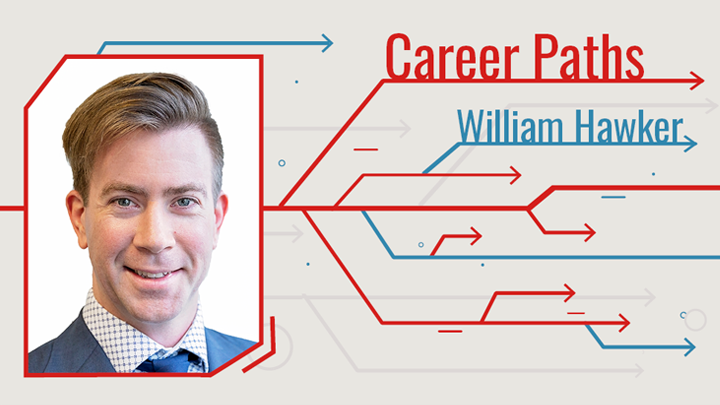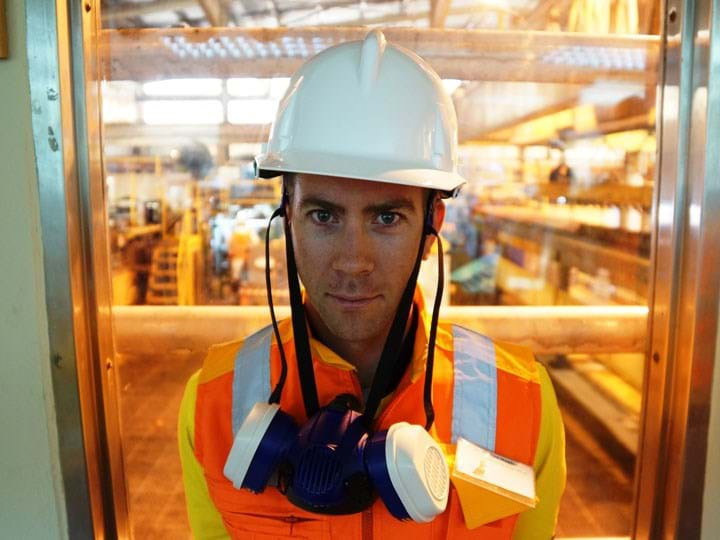Pure Processing for Battery Tech

William Hawker discusses his role in commercialising low cost, low emissions processes for production of lithium-ion battery cathode material
IN THIS series, we speak to chemical engineers working outside of the fossil fuel sectors to highlight the breadth of opportunities open to those just starting their careers or seeking to change sectors.
William Hawker is Chief Technology Officer of Pure Battery Technologies in Australia. The company is commercialising low cost, low emissions processes for production of lithium-ion battery cathode material from both primary and recycled materials. William says his first steps into engineering were inspired by his father who worked as a process engineer in EPC and would come from projects across Australia with handfuls of mineral samples and exciting stories of the huge plants he was commissioning. William went to study a dual major in chemical and metallurgical engineering at the University of Queensland and then a doctorate.
“During my time at UQ I helped to invent and develop the processes we are commercialising and now as CTO my main responsibility is bringing these processing technologies into commercial reality. This means managing research and development test work with our research partners, managing demonstration activities at our demo plant in Germany, teaching and training our engineers, plant managers and operators, and putting this all together in our full-scale plant design projects.”
What aspects of chemical engineering do you apply in your everyday role?
“Put simply, safety, chemistry, and mass balancing.
“I find every day I am talking about these, often to people who are not engineers, let alone chemical engineers, so a very clear understanding of these topics with relative and relatable examples or explanation is required. And mass balancing is even more critical for the engineers, whether it's research and development, demonstration or operations, the mass balance is the only way to actually know what is happening and measure the performance of your process.”
What is the most rewarding part of your role?
“The absolute best part of my role right now is being able to work with a hand-picked team of engineers. We all have different personalities, backgrounds and experience which one might think is a hinderance but actually allows us to work together very well. It’s very rewarding to be able to contribute to the development of the team, and each team member, and give them the opportunities to help each other grow and develop in their careers too.”
How does your role contribute to helping solve society’s grand challenges?
“In 2010, the Intergovernmental Panel on Climate Change identified that in that year, the equivalent of 50 Gt of CO2 was emitted by human activities. Fifteen percent of this was from transportation activities, and 75% of transportation emissions were car and truck operating emissions. That means 12% of global CO2 equivalent emissions from car and truck operation. Solving climate change is the biggest challenge of the modern world, and the primary reason for the electrification of the automobile industry.
“At PBT, we have developed the most efficient, effective, and environmentally friendly process for production of nickel-containing cathode material used in lithium-ion batteries required for the electrification of the automobile industry. So, our entire business is based on innovation and climate action.”
What are the key challenges in your sector that chemical/process engineers are well equipped to help address?
“In Australia, one of the key challenges I see is transforming the view that the resource industry is negatively contributing to society’s grand challenges and to climate change. One of the follow-on effects of this is that very few engineering students are aware of the opportunities in the resource industry and so they don’t choose their major with these opportunities in mind, or look to gain experience that would help them work toward a career in the resource industry.
“There are two reasons we are well equipped to address this challenge. Firstly, I have not yet met a metallurgical or chemical engineer who is not passionate about their job and enjoys talking about the impact they can have. This enthusiasm from people working in the industry would help the students become aware of the opportunities. Secondly, the actual impact I see on addressing global challenges most commonly comes from young, innovative engineers within the industry. Hence, student engineers and recently gradated engineers start their careers at the perfect time when there are these grand challenges to address and the world will be looking to us for solutions.”

What chemical/process engineering skills are in demand in your sector?
“I will complain a little here that I see very few engineers with really good fundamental understanding of chemistry and thermodynamics but that might just be because I have spent a lot of time working in those areas. The other area where I often see a gap is big picture or systems thinking, perhaps as an outcome of the way we are trained, either focusing on individual unit operations without putting it in context of the overall operation, and even wider to the industry and the rest of the world.
“Perhaps the most relevant point is simply to highlight that critical thinking is the hallmark of a good engineer and it is, and always will be in high demand.”
What advice would you give to a recent graduate or early careers chemical engineer who wants to work in your sector?
“My number one piece of advice would be to make your own career path. Graduate programmes, continuing professional education, higher degrees are all useful but having everything planned and mapped out or focusing on a checklist will mean you miss opportunities. I recommend turning up to whatever job or role you can get, switching your brain on and doing your best to make a difference. Then see what happens.”
What advice would you give to an engineer considering moving into your sector from a different sector?
“Tough question. Aside from any technical skills required, use your own individual skills and experience. Not along the lines of finding a resource industry role which is similar to your own but rather by applying your way of thinking to the resource industry problems.”
What skills have you developed since leaving university that you think have been key in helping you achieve your career aims?
“In some ways, I left university much later than most so if we are talking about since my undergraduate engineering degree, the top skill I have developed was a very deep technical understanding of aqueous solution chemistry and thermodynamics. Since leaving my academic role at the university to work in industry, the key skills I have had to learn very quickly are around managing a team and workloads, in particular how to delegate responsibility, and decision making while remaining accountable for the outcomes. In my current role I am ultimately accountable for the success of the process technologies even though I cannot be the one doing all of the work and making all of the decisions.”
Do you expect the need will grow in your sector for people with chemical engineering skills?
“Definitely. I see a significant generational gap in people in the resource industry due to the common belief that it is highly polluting and causing climate change. This has led to even fewer younger people joining an already ageing industry workforce. There will be even more need for people with the right skills in the near future.”
To read more articles in this series visit https://www.thechemicalengineer.com/tags/career-paths
Recent Editions
Catch up on the latest news, views and jobs from The Chemical Engineer. Below are the four latest issues. View a wider selection of the archive from within the Magazine section of this site.




